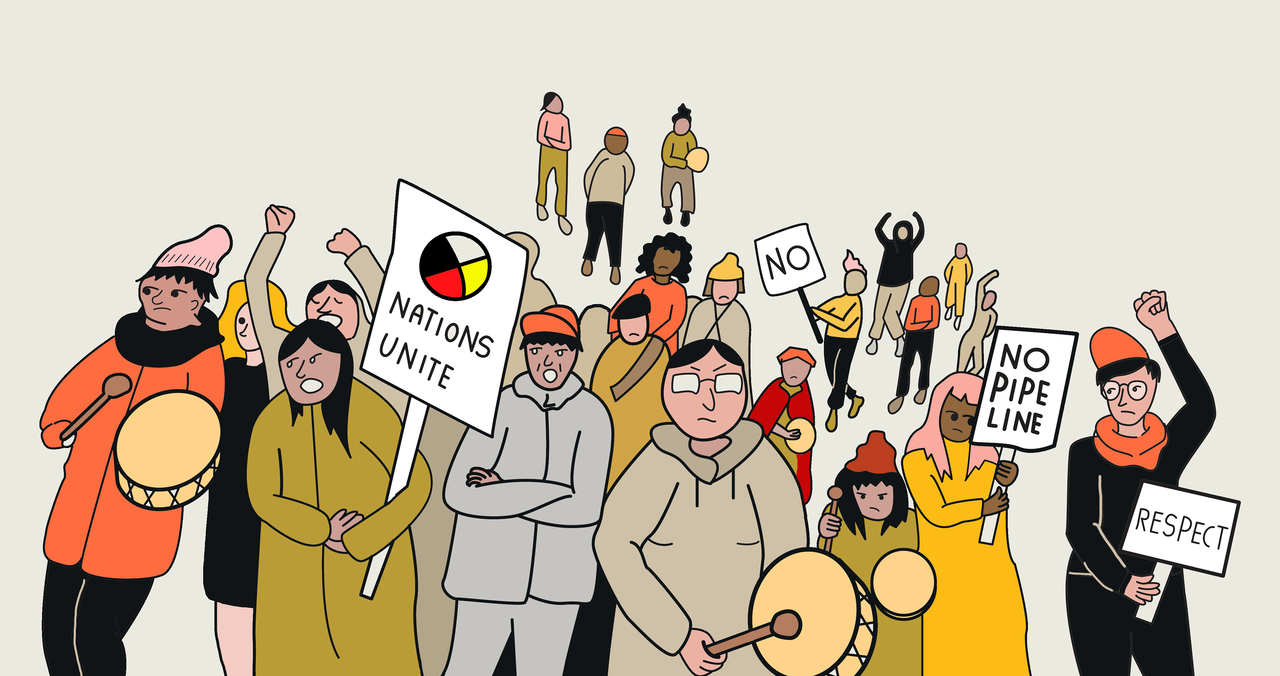We often hear the word “reconciliation” and think of positive connotations: restoring relationships between people, or trying to make certain views more compatible.
But it seems that this word is losing its power and its positivity, as Prime Minister Justin Trudeau uses it as a buzzword when speaking about the relationship between the government and Indigenous Peoples in Canada. Of course, we have to realize that this word comes up so often because of the Truth and Reconciliation Commission. Yet, Trudeau very cunningly uses the word to satisfy settlers who don’t follow Indigenous issues too closely, but vaguely know that some compensation is in order.
We believe that, in the background, reconciliation is low on the Canadian government’s list of priorities. At least, it is below economic gain. This has been evident in abundant clarity by the government’s response to recent protests by the Wet’suwet’en people and allies in British Columbia against the TransCanada Pipeline. We at The Concordian strongly stand with the Wet’suwet’en people and their protest against the pipeline being built on their territory.
A court order from Dec. 14, 2018 granted TransCanada an injunction that allows them access to the construction site and to remove the blockade, according to The Guardian. Dozens of protestors gathered on Jan. 7 to block the construction of the Coastal GasLink, a natural gas pipeline, which is a $40 billion project by TransCanada, according to CBC. The RCMP arrested 14 protestors at the pipeline blockade last week.
TransCanada has said that they have the support of Indigenous leaders along the proposed route. On Thursday, Wet’suwet’en hereditary chiefs came to an agreement, after three days of meetings with the RCMP, but this is not a decision that reflects their true wishes. “We are adamantly opposed to this proposed project and that will never change, but we are here to ensure the safety of our people,” said Chief Na’Moks, who was present at the meetings, according to CBC.
We at The Concordian think it’s clear that this is another case of Indigenous Peoples’s voices being ignored. It’s another occurrence of Indigenous land being taken, despite laws and agreements being put in place to protect that very land. Trudeau himself stated multiple times during his campaign that he would not allow projects on Indigenous Peoples’s land without their explicit consent.
When we hear Trudeau bring up reconciliation and partnership between Indigenous Peoples and the Canadian government, we can’t help but feel skeptical. Constructing a massive pipeline on stolen land in the first place is wrong––how can our leader “work alongside” Indigenous Peoples while simultaneously taking what is rightfully theirs? It’s evident that there is not a clear and honest dialogue taking place. In fact, these recent events that have transpired highlight just how far we have left in order to truly reach reconciliation with Indigenous Peoples. Oftentimes, when we think of reconciliation, we only focus on the context of past colonial violence. These events are showing us that that is not enough––injustice towards Indigenous Peoples is not isolated to the past; it is ongoing.
Enforcing the submission of Indigenous Peoples to the interests of colonisers is in fact the reason that the RCMP was created in the first place. John A. MacDonald established the then-named North-West Mounted Police in 1873 to enforce laws created by the Department of Indian Affairs, such as confining Indigenous Peoples to reserves or outlawing their religious ceremonies. The RCMP’s website says their origins lie in “implementing the law in Canada’s newly acquired western territories.” Obviously, that’s not the whole story. In fact, one of the earliest tasks of the mounties was to help negotiate treaties with Indigenous Chiefs, getting them to sign by promising only good will––a promise that Indigenous Peoples soon saw was not, in fact, made in good will.
It’s no surprise that today, Indigenous Peoples are being coerced out of their land rights by our government in favour of highly valued (and highly toxic) construction projects. It would be foolish to trust the government to respect Indigenous rights—and beyond foolish to trust their supposed desire for reconciliation. This is why we at The Concordian commend the many protestors that are opposing the pipeline, and encourage you to stay informed about Indigenous issues and rights, and participate in direct action as much as possible.
Graphic by @spooky_soda
